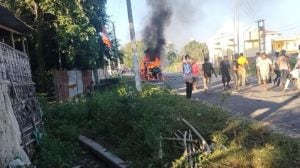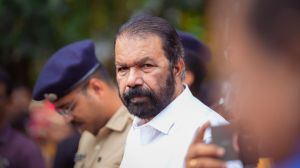Bhils: Landless lords of Dangs
AHMEDABAD, Jan 17: The Bhils are the most backward tribals of the Dangs district, ``the poorest of the poor'', as a government officer pu...

AHMEDABAD, Jan 17: The Bhils are the most backward tribals of the Dangs district, “the poorest of the poor”, as a government officer puts it. Their story is one of dispossession of a people in their own land, which goes back to the British period. And it is without parallel in India.
Once the Bhils were the lords of the Dangs. The British never conquered them; neither did the 14 Bhil chieftains of the Dangs ever accept the suzerainty of the British Crown, unlike the numerous princely states that dotted the map of pre-Independence India.
The Dangs came under the British control, without actually becoming part of the British empire when the East India Company took the area on lease from the Bhil chieftains in 1842. It was looking for timber to run its ship-building business in Bombay, and the Dangs had excellent teak forests. Initially, the lease was for 16 years; in 1862, it was extended “in perpetuity” for Rs 13,039, according to the Dangs gazetteer.
Later, with the change of rulers, the Dangs also changed hands: from East India Company to the British Government, then to the Bombay Government and, after the division of Bombay, to the Gujarat Government. After Independence, the enforcement of forest protection laws became strict.
“The Bhils, who formed essentially a hunter-gatherer tribe, were the worst-hit”, explains Gujarat Rashtriya Janata Party president Madhusudan Mistry, who is a tribal and has been running an NGO, Eklavya, which works in the tribal areas.
Besides, since they never settled at one place, “the Bhils were left out” when the Gujarat Government gave settlement rights to tribals, says social activist Achyut Yagnik. Most of the land went to “traditional cultivators”, like Kanbis, Varli and Koknas.
Initially, the Bhils worked as forest labour. After felling was stopped in 1988, they started working as unskilled labour in sugar mills. But since the mills work only about six months a year, the Bhils remain the poorest and, according to a senior officer, are “looked down upon by other tribals”.
Before the forest leases, the Bhils were known for “a sturdy spirit of independence and intolerance of any external intereference”, according to the gazetteer. They maintained themselves by “raids and exacting blackmail from the rulers of adjacent territories”. And, the gazetteer adds, they fought against the Peshwas, the Gaekwads, and the British.
While taking the forests on lease, the British only “took care of their interests… and maintained a modicum of law and order”; the Dangs chiefs and people were “left alone to fend for themselves”, says the gazetteer. The chiefs acquiesced in this because of their “ignorance, illiteracy, lack of political consciousness and administrative ability”.
In 1879, the Dangs were notified as forests under the Indian Forests Act. In 1889, the forests were “settled” and the Dangs were divided into reserved and protected forests. Cultivation was forbidden in reserved forests. To compensate the chiefs, the lease money was raised to Rs 17,859 in 1893.
The British regularly paid this money at a “Bhil darbar”, which was held every year. In 1954, however, the rights and privileges of the Bhil chiefs were extinguished by granting a hereditary political pension. The darbar is still held at Ahwa on Holi every year. Since the families of the chiefs and their dependents have grown, the amount each of them gets is a pittance.
Incidentally, since the Dangs were never part of the British empire, they were treated as a protected foreign territory and governed under the provisions of the Foreign Jurisdiction Act, says the gazetteer. But, on the eve of Independence, the Dangs were merged in Bombay province. “No agreement was taken from the chiefs on the ground that they were too illiterate”, says the gazetteer.
The Bhil chiefs met on July 25, 1947, protested against the decision, asserted their “right of self-determination within the Union of India”, and demanded that the Dangs should continue “as a group of states in the Gujarat states group and western India states federation”.
The Government of India ignored their protest, but on bifurcation of Bombay on May 1, 1960, the Dangs were finally included in Gujarat. The Bhils, thus, became part of Gujarat, but they remain the proverbial poor cousins in their own land.





- 0120 hours ago
- 0220 hours ago
- 0320 hours ago
- 0420 hours ago
- 0520 hours ago


























